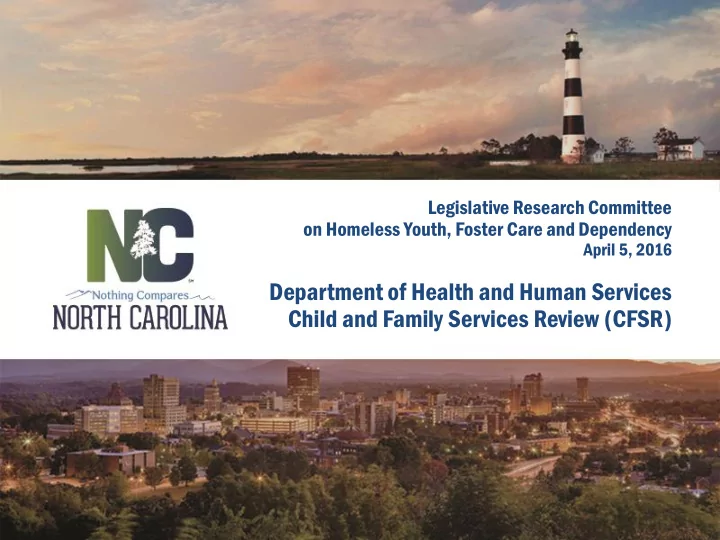

Legislative Research Committee on Homeless Youth, Foster Care and Dependency April 5, 2016 Department of Health and Human Services Child and Family Services Review (CFSR)
Foundation of the CFSR • The U.S. Health and Human Services, Administration on Children and Families, Children’s Bureau leads the review process • In 2015, North Carolina experienced the third of such reviews (previous reviews - 2001 and 2007) • In response to states and other stakeholder feedback, many changes made to the review process • Intended to illuminate areas of greatest need and as such should not be seen as a “pass or fail” test • All states will develop plans to improve the Child Welfare system 2 LEGISLATIVE RESEARCH COMMITTEE ON HOMELESS YOUTH, FOSTER CARE and DEPENDENCY | CHILD AND FAMILY SERVICES REVIEW (CFSR)
Structure of the CFSR • Outcomes (7) related to: Safety (2), Permanency (2) and Well-being (3) • Outcomes are measured by case reviews using a federally defined tool and protocol • Safety 1 and Permanency 1 also have aggregate data indicators which must be met • Systemic Factors (7) when present, are supportive of consistent quality services • Measured by a state-submitted report and stakeholder interviews conducted by Administration for Children and Families (ACF) staff 3 LEGISLATIVE RESEARCH COMMITTEE ON HOMELESS YOUTH, FOSTER CARE and DEPENDENCY | CHILD AND FAMILY SERVICES REVIEW (CFSR)
Child welfare outcomes • Safety 1: Children are, first and foremost, protected from abuse and neglect • Safety 2: Children are safely maintained in their homes whenever possible and appropriate • Permanency 1: Children have permanency and stability in their living situations • Permanency 2: The continuity of family relationships and connections is preserved for children 4 LEGISLATIVE RESEARCH COMMITTEE ON HOMELESS YOUTH, FOSTER CARE and DEPENDENCY | CHILD AND FAMILY SERVICES REVIEW (CFSR)
Child welfare outcomes continued • Well-Being 1: Families have enhanced capacity to provide for their children’s needs • Well-Being 2: Children receive appropriate services to meet their educational needs • Well-Being 3: Children receive adequate services to meet their physical and mental health needs 5 LEGISLATIVE RESEARCH COMMITTEE ON HOMELESS YOUTH, FOSTER CARE and DEPENDENCY | CHILD AND FAMILY SERVICES REVIEW (CFSR)
Case reviews – On Site Review Instrument (OSRI) • 105 case reviews (59 foster care and 46 in-home) were conducted via a state-led case review process in Buncombe, Craven, Cumberland, Durham, Hoke, Jackson, Mecklenburg, Pitt, Scotland, Swain, Wake, and Wilson counties between April 1, 2015 and Sept. 30, 2015 6 LEGISLATIVE RESEARCH COMMITTEE ON HOMELESS YOUTH, FOSTER CARE and DEPENDENCY | CHILD AND FAMILY SERVICES REVIEW (CFSR)
Systemic Factors (7) • Statewide information system • Case review system to ensure the agency and courts achieve permanency in a timely manner, and families are engaged in the process • Quality assurance system statewide to ensure children are provided quality services that protect their health and safety • Staff and provider training ensures that staff statewide are properly trained to assess cases, and deliver services 7 LEGISLATIVE RESEARCH COMMITTEE ON HOMELESS YOUTH, FOSTER CARE and DEPENDENCY | CHILD AND FAMILY SERVICES REVIEW (CFSR)
Systemic Factors (7) continued • Service array and resource development that is accessible, and appropriate to meet individualized child and family needs • Agency responsiveness to the community through ongoing consultation with service providers, foster care providers, the juvenile court, and other public and private child and family serving agencies • Foster and adoptive parent licensing, recruitment, and retention 8 LEGISLATIVE RESEARCH COMMITTEE ON HOMELESS YOUTH, FOSTER CARE and DEPENDENCY | CHILD AND FAMILY SERVICES REVIEW (CFSR)
Developing a plan for improvement • Five work themes were identified: – Court Collaboration • Issues to timeliness for hearings, including Termination of Parental Rights – County Practice • Helping front-line social workers identify needs and arrange appropriate services – System Infrastructure • Quality Assurance and management oversight – Stakeholder Engagement • Community responsiveness and special populations – Service Collaboration • Access and effectiveness of behavioral health services, domestic violence services, and parenting supports 9 LEGISLATIVE RESEARCH COMMITTEE ON HOMELESS YOUTH, FOSTER CARE and DEPENDENCY | CHILD AND FAMILY SERVICES REVIEW (CFSR)
Developing a plan for improvement continued • DHHS staff met with representatives from ACF Children’s Bureau on March 28 and 29 to review preliminary plan outline and provide feedback • Plan will need to address: • Updating the practice guidance provided to all counties to communicate expectations of performance • Enhance workforce capacity to ensure that the front line has the knowledge and skills necessary to conduct the practice guidance • Collaboration with the judicial system using data to illuminate areas of concern • Improve system infrastructure regarding quality assurance activities, service provision by partner agencies and information management 10 LEGISLATIVE RESEARCH COMMITTEE ON HOMELESS YOUTH, FOSTER CARE and DEPENDENCY | CHILD AND FAMILY SERVICES REVIEW (CFSR)
11 LEGISLATIVE RESEARCH COMMITTEE ON HOMELESS YOUTH, FOSTER CARE and DEPENDENCY | CHILD AND FAMILY SERVICES REVIEW (CFSR)
Recommend
More recommend